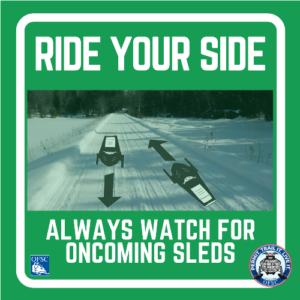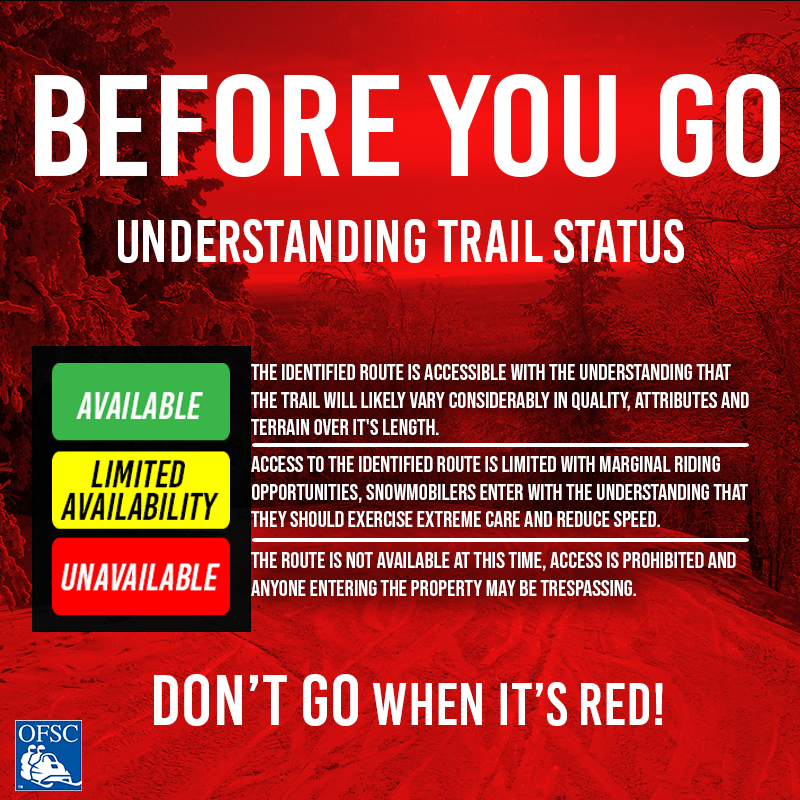Recreational Trail Riders Encouraged To Make Smart Choices, Ride With Care & Control
International Snowmobile Safety Week, January 15 to 23
Key Points:
- Ride responsibly for your own safety and for the safety those who share the trails with you.
- Trail safety message especially important for participants new to organized snowmobiling.
- Recreational OFSC trails are statistically the safest place to ride a snowmobile.
- No snowmobile fatalities reported to date this season on OFSC trails.
(Barrie, ON – January 13, 2022): The Ontario Federation of Snowmobile Clubs (OFSC) joins the North American snowmobile community and our Ontario Provincial Police (OPP) partners in celebrating the 2022 snowmobile season with International Snowmobile Safety Week, January 15 to 23. The OFSC is the non-profit, volunteer-driven association that oversees organized snowmobile trails in Ontario.
Safety Week is an excellent opportunity for the OFSC to deliver a season-long message to recreational trail riders: Ride responsibly for your own safety and for the safety those who share the trails with you.
“Safe trail riding is always a top priority for the OFSC,” said Ryan Eickmeier, CEO, “but it’s even more important for every snowmobiler to take our common sense message to heart this winter as we welcome so many new riders to our trails.”
Tens of thousands of Ontario snowmobilers choose to ride OFSC Prescribed Snowmobile Trails each winter and return home safely after every ride. These winter enthusiasts, who ride with an Ontario Snowmobile Trail Permit on their sleds, can collectively travel up to 150 million kilometres per season on 30,000 kilometres of OFSC trails. This is one of the world’s largest recreational trail systems, totaling almost twice as many kilometres as Ontario’s provincial highway network.
OFSC trails are statistically the safest place to ride a snowmobile. As of January 10th, no snowmobile fatalities reported this season have occurred on any OFSC trail. But snowmobilers must always remember that trail riding, like many other outdoor activities, has inherent risks. Not least is that this activity occurs in an unpredictable and uncontrollable natural environment, often far from home, so trail riders must always be prepared for the unexpected by making smart choices and operating their sleds with care and control.
Smart Choices
Smart choices start with always staying on available, designated OFSC trails. Wandering off any trail surface into unbroken snow, unfamiliar terrain or farmers’ fields can not only be risky for the rider, but may also compromise the safety of landowners or their property.
The OFSC Interactive Trail Guide (ITG) helps trail riders make the smart choice of staying on the trail. The ITG is the only authorized source of information for recreational snowmobiling on OFSC Prescribed Trails. Using the ITG or the Go Snowmobiling Ontario App, riders can confirm that trails are either GREEN (available) or YELLOW (limited availability) trails before every ride. Any trails shown in RED (unavailable) are not safe for any snowmobiler to ride at that time. The PRO version of the Go Snowmobiling App even includes a “Share My Location” function that can be used as a safety tracker in case of emergency.
Smart choices also start with good training. OFSC Driver Training is the snowmobile safety course authorized by the Ministry of Transportation of Ontario (MTO). This online course is available for anyone aged 12 or older to teach new snowmobilers the skills and habits necessary to be safe and courteous trail riders. Since inception, Driver Training has graduated 250,000 students who qualified to obtain a Motorized Snow Vehicle Operator’s License issued by MTO.
Trail riders should always choose the right safety gear. This includes a properly fitted, fastened and approved snowmobile helmet, and brightly coloured, weather proof outerwear with reflective materials, purpose-made for snowmobiling. A protective TekVest is also a worthwhile addition to trail safety gear.
This winter, the OFSC encourages every trail rider to make one more smart choice. Everyone needs to respect the safety of the communities we visit, service providers we encounter, residents we interact with, and of other snowmobilers, by following health protocols established by the Province and public health units.

Best Practices
In addition to snowmobile safety fundamentals like avoiding alcohol/drug impairment and speeding, and to always “know before you go” on any ice, the OFSC Safety Week message reminds participants of best practices for recreational trail riding with care and control, including:
- Ride within your abilities and comfort level.
- Know your sled and its capabilities, keep it well-maintained.
- Always ride with a companion(s).
- Ride in single file on the trails.
- Leave plenty of space between you and the sled ahead.
- Ride your side of the trail.
- Take responsibility for the rider behind you.
- Be especially vigilant coming into corners or cresting hills.
- Pass groomers and other riders cautiously.
- Take extra caution on public streets and logging roads.
- Slowdown at night or when visibility is poor, when non-motorized users are on the trail, or when passing through towns or residential areas.
- Stay alert to the trail ahead and aware of your surroundings.
- Stop on the trail at locations with clear sightlines in both directions.
- Check area weather conditions before your ride.
- Before leaving home, notify someone where you will be riding and when you expect to return.
- Always carry an emergency kit, snacks, extra fuel, a tow rope and a communication device.
Riding on organized OFSC trails is a special privilege for Ontarians and the OFSC encourages all trail riders to embrace our Snowmobile Safety Week message all season. Please make smart choices and riding with care and control part of your group’s routine behaviour on every trail.
The Ontario Federation of Snowmobile Clubs (OFSC) is a volunteer led, not for profit association that provides the voice for organized snowmobiling in Ontario. OFSC snowmobile trails managed by 200 community based, member clubs generate up to $3.3 billion in economic activity in the province each year.


